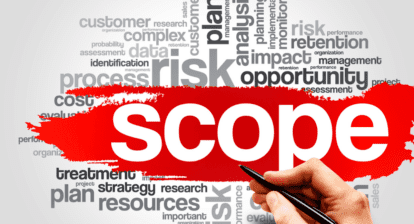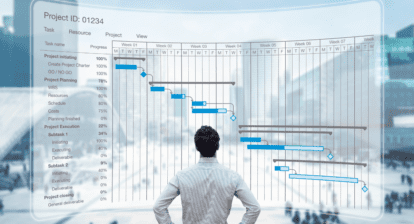
Earned value management is an approach for performance management on projects. It combines time, cost, and scope to create an integrated view of planned progress, as it compares to what was actually achieved.
In this article, we will define earned value, and discuss why earned value management is important to project success.
Defining Earned Value
‘Value’ is represented as a financial figure, and it is ‘earned’ by working through the items on the schedule and delivering chunks of scope. Think of it as a way of describing what you’ve got at any given time in return for the money you’ve invested.
The two strands of time and money work together and it is important that they are viewed that way. After all, a project that is overspent might look bad on paper. However, if the overspend has happened because the team is way ahead of their delivery and they’ve managed to make massive progress, perhaps that additional spend is warranted and will even out over the rest of the project.
Equally, if a project looks under budget, that could signify the team has delivered very little at all – or they are being exceptionally good at cost management.
Unless you know what the money and time has gotten you, it’s hard to see the full picture of progress. Cost management processes are important, but you need the context of what results you’ve achieved for the cost to really know if you’re on track to get the results you planned.
Putting Data in Context
Time, money, and scope come together in a time-phased budget and a project schedule. The schedule determines the work to be done over the project lifecycle. The budget is phased according to when it will be spent. The critical path is identified, and often that’s where teams spend their effort, because if a task takes longer (or a non-critical task becomes critical) then the project dates are pushed out.
This is no different from how you manage projects without earned value – as a project manager, you’d still be interested in the critical tasks and making sure the project doesn’t run late and overspend. The difference with applying earned value is simply that you can track and manage performance in a data-driven way.
And the data is interesting. For example, researchers looking at delivered US Air Force contracts saw that once a project was 20% of the way through, the cumulative Cost Performance Index (a way of determining if tasks are using more or less of their allocated budget) does not change by more than 10%. If those were your projects, you’d be confident knowing that once you’d done a fifth of the work, you were probably going to continue at the same level of cost efficiency. It’s a good way of predicting future performance, and that’s one of the main reasons why project leaders choose to adopt earned value management practices.
Here are five more reasons why earned value management (EVM) is beneficial to the projects using it.

5 Reasons Why Earned Value Management is Important
1. EVM improves project performance management.
The main reason for investing in earned value management systems is to improve and standardize project performance management. There is no hiding with earned value management: you’ve either done the work, in time and on budget, or you haven’t. It’s a great way to encourage accurate, transparent reporting of cost and schedule performance.
Keep in mind that you do need to put in the work upfront. For example, establish how the progress of tasks will be measured, how the whole EVM approach will be set up, and how reports will be made. But if you are struggling to get accurate performance reporting out of the portfolio, EVM is one way to introduce greater rigor and oversight.
2. EVM allows for cross-project comparison.
Earned value metrics are standardized. As long as your project has a time-phased budget, and can work within the parameters of the process, then you can collate reliable, repeatable data about performance.
When each project is measured and reported in the same way, you can easily compare projects.
This is a huge advantage for PMO teams and portfolio managers who may want to review project performance across multiple projects. The data does need to be considered holistically – a project might not look as good on paper as another project because it’s more complex, has a different set of stakeholders, or has gone through changes – but it’s a useful starting point.
This kind of comparative data could be used as part of ‘lessons learned’ exercises or deep dives into processes so that the whole organization can benefit from good practice.
3. EVM improves communication.
The shared language of earned value gives you a common vocabulary. OK, it’s a pretty complex vocabulary, with plenty of acronyms and terms that don’t mean much to anyone working outside of project controls, but the jargon is specific and useful in context.
When everyone understands what they are looking at, and how progress is reported and forecasted, the whole team is on the same page. EV data is transparent and accurate (assuming it has been inputted into the system accurately). It sparks a conversation about ‘why’ when variances are exceeded and encourages teams to track and report in common ways.
4. EVM improves risk management.
The time-phased budget is made up of work packages – and getting to the work packages means spending time understanding what is in each one.
The effort involved in comprehensively identifying the scope of the work can reduce risk as it minimizes the chance of surprise changes later. Of course, you can’t guarantee that nothing will change, but because there is a substantial amount of work to be done defining estimates, working out scope, and really digging into the details, it is less likely that you’ll miss something big.
Because this way of planning relies on knowing what you are doing at a detailed level, it is less suitable for projects where the outcome is uncertain or there is a high degree of expected volatility and change.
Risk planning forms an early part of the project. The mitigation activities and costs can be factored into the work plans. There’s a big focus on identifying and managing risk so that future performance isn’t affected by a risk materializing.
5. EVM puts the focus on momentum.
Although it might seem like a lot of earned value is about looking backward and creating performance reporting on what you’ve completed, it enables forward planning. The data that comes out of an earned value system helps you spot performance trends and act on them.
The focus is very much on keeping the project moving forward, with corrective actions to ensure the schedule stays on track. The team can make data-driven decisions about what to do. Data helps them predict the impact of their choices.

In summary, managing cost and progress come together in an earned value environment to give you a way of measuring and forecasting performance. It won’t be appropriate for every project, but it’s helpful to understand its benefits and why you might want to use it, so you can make the right choice about implementing earned value management on the right projects.
Related Content
Time is Money: The Importance of Earned Value Management
Earned Value Management (EVM) in Agile Development
Webinar: “EVM” – Earned Value Management – Not Just Another 3-Letter Acronym!








Eric Christoph
Nice article! I’ve found that the single greatest contribution that EVM makes to a project is that it forces the team to do a better job defining scope. This in turn makes every other process run better.
Elizabeth Harrin
Eric, definitely! When scope is clearly defined, work can progress in a much smoother way with a lot less conflict and rework.
Ronald B. Smith, PMP
Nice article!
Would of liked to have seen a formula example of using Earned Value so the readers have a better understand of your topic. You are really talking about financial analyses on “work-in-process” projects versus doing financial analysis on “potential” projects.
Elizabeth Harrin
Hello Ronald, thanks for the comment and apologies for the delay in following up. There is another article here on formulas: https://www.mpug.com/introduction-to-earned-value-formulas/